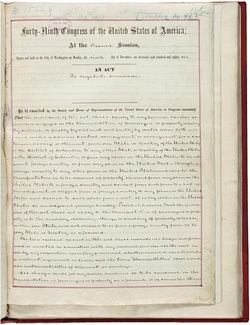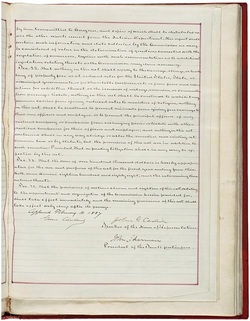The Interstate Commerce Act

The Interstate Commerce Act
Facts
- In 1887, Congress passed the Interstate Commerce Act. The act made the railroads the "first industry subject to Federal regulation" (Act).
- A five-member enforcement board called the Interstate Commerce Commission was formed.
- The act was passed in response to a demand for some kind of regulation of the railroads, which were a large and powerful industry.
- Post-Civil War, railroads had gained a natural monopoly over the areas that they serviced.
- Monopolies "obstruct the free competition that determines the price and quality of products and services offered to the public. The railroad monopolies had the power to set prices, exclude competitors, and control the market in several geographic areas. Although there was competition among railroads for long-haul routes, there was none for short-haul runs. Railroads discriminated in the prices they charged to passengers and shippers in different localities by providing rebates to large shippers or buyers" (Act).
- When railroads that controlled a specific area decided these things, they hurt small farmers that shipped goods but did not have the quantity to be "power players."
- With the Wabash case, the right of Congress to regulate Interstate Commerce was established.
- "Applying only to railroads, the law required "just and reasonable" rate changes; prohibited special rates or rebates for individual shippers; prohibited "preference" in rates for any particular localities, shippers, or products; forbade long-haul/short-haul discrimination; prohibited pooling of traffic or markets" (Act).

The Interstate Commerce Act
Problems
- Some of the provisions of the law encouraged competition between monopolies and others punished the for it. Because of this, the law was somewhat ineffective.
- The law did ban" special rates the railroads would arrange among themselves, although determining which rates were discriminatory was technically and politically difficult" (Act).
- The five-member Interstate Commerce Committee (ICC) was successful and later became a model for other enforcement committees. One of the requirements, that the railroads turn in annual reports to the ICC, was very successful.
- "The Interstate Commerce Act challenged the philosophy of laissez-faire economics by clearly providing the right of Congress to regulate private corporations engaged in interstate commerce. The act, with its provision for the ICC, remains one of America’s most important documents serving as a model for future government regulation of private business." (Act)
